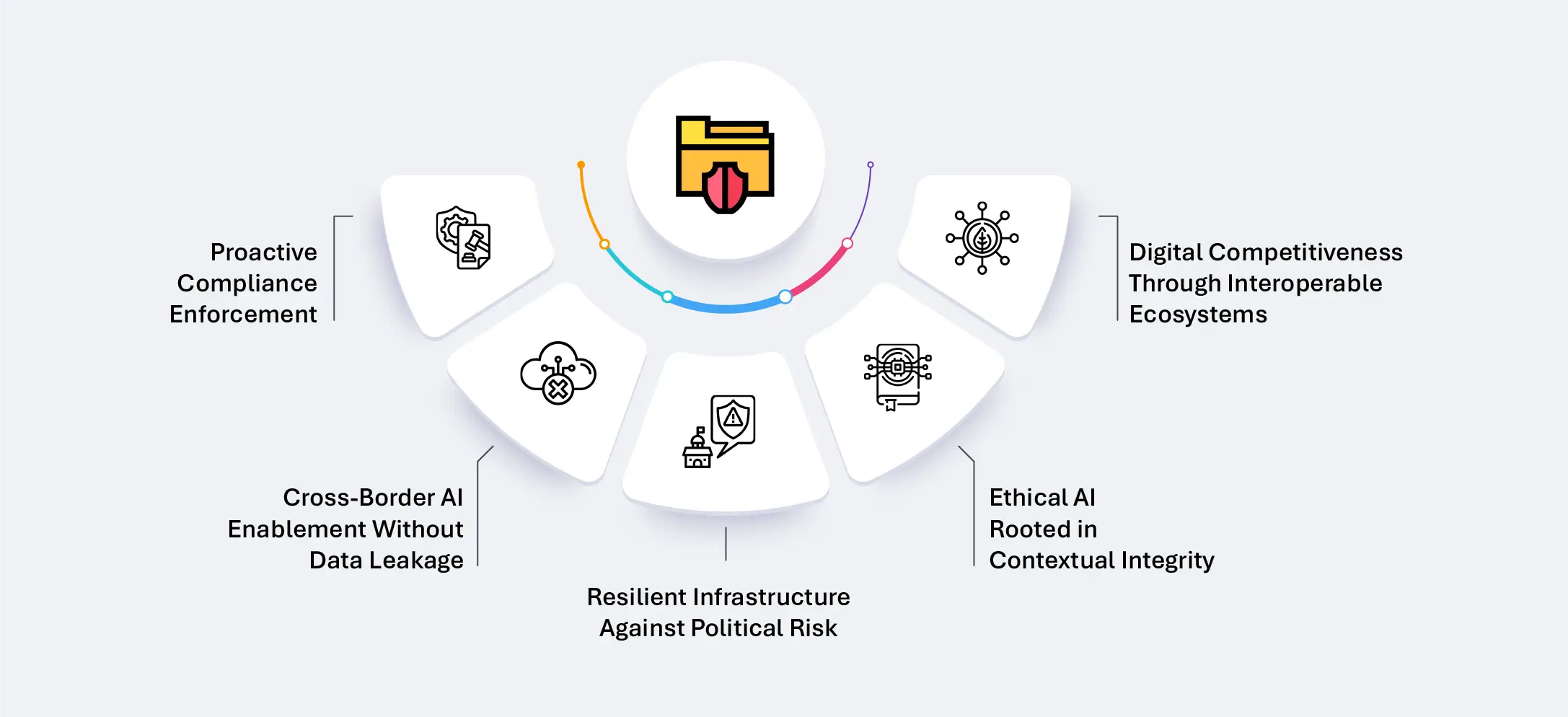2025 has marked a fundamental shift in how nations and enterprises view digital power. The world is no longer asking whether data needs to be protected—it’s demanding to know who owns it, where it resides, how it flows, and under what jurisdiction.
Globalization promised frictionless data movement. But that promise is unraveling. Countries are drawing digital borders—not to isolate, but to protect. This is the era of data sovereignty. And it’s not just reshaping geopolitics—it’s rewriting the rules of digital governance.
What’s driving this transformation? It’s not just fear of breaches or regulatory overreach. It’s a breakdown of trust in the current data order—and a collective call for control in an AI-powered, cloud-dominant world.
When Digital Borders Harden, the Internet Doesn’t Break—But Innovation Might
For decades, digital governance was largely dictated by the priorities of multinational tech giants headquartered in the United States and parts of Europe. Data was collected en masse, stored wherever it was cheapest, and often processed without much oversight beyond privacy policies buried in the fine print. That laissez-faire model worked—until it didn’t.
A wave of revelations, from Snowden’s NSA files to Facebook’s Cambridge Analytica scandal, shattered public trust. Governments began to ask hard questions: Why should data on our citizens be subject to foreign jurisdictions? What happens when adversaries gain access to sensitive datasets through cloud providers hosted overseas? Who’s accountable when AI models built on foreign data misrepresent or exploit local populations?
The response was swift and global. China tightened its Cybersecurity Law, requiring that data on Chinese citizens remain within its borders. Russia implemented its Federal Law on Personal Data, demanding local storage. India’s Digital Personal Data Protection Act (DPDP), passed in 2023, emphasized sovereign control over citizen data. And the EU, always a bellwether in digital regulation, doubled down on its GDPR enforcement and proposed new frameworks under the Digital Services Act and Data Governance Act.
As of 2024, over 75 countries had enacted or proposed data localization or sovereignty laws, according to the Information Technology & Innovation Foundation (ITIF).
Take any cross-border enterprise today. A single AI model built in Europe might now require separate training pipelines for Asia, special encryption for data stored in the U.S., and a localized backup strategy for the Middle East. The result? Slower innovation. Rising costs. Operational silos. And massive complexity.
According to McKinsey, cross-border data flows now contribute more to global GDP growth than the trade of goods. But if data walls continue to rise without coordination, the World Economic Forum warns of a fragmented internet, where cooperation on global challenges like pandemics, climate, or financial crime becomes nearly impossible.
That’s the paradox: the harder we try to protect data, the more we risk losing the benefits it brings.
The Answer Isn’t Centralized Control. It’s Federated Trust.
At a time when digital sovereignty is non-negotiable, the question isn’t whether nations should own and control their data. That’s already happening. The real question is: how do we make sovereignty scalable, without compromising interoperability or innovation?
The answer lies in federated data governance.
Federated governance flips the script. Instead of trying to centralize or liberate data entirely, it embraces a decentralized model where data remains under local control but becomes accessible through secure, policy-driven, and auditable frameworks.
Picture it like a digital Schengen zone for data: every country retains its border, but shared protocols allow secure passage. Data doesn’t move without consent. Policies travel with the data. And access is granted only through approved, tamper-proof mechanisms.
Technologies enabling this vision aren’t theoretical—they’re here.
Secure multi-party computation (SMPC), homomorphic encryption, and federated learning are already being used to train AI models without sharing raw data. Blockchain-based audit trails track who accessed what, when, and why. And AI-powered metadata engines classify and contextualize data across jurisdictions—automatically enforcing regulatory controls.
Why Federated Data Sovereignty Is a Strategic Imperative

As organizations navigate an increasingly complex web of data sovereignty laws, federated data governance is emerging not just as a compliance strategy but as a catalyst for digital transformation. Here’s why it’s becoming a strategic imperative for enterprises and nation-states alike:
- Proactive Compliance Enforcement: Embedding jurisdictional controls into your data architecture ensures regulatory alignment by design, not as an afterthought. Federated models enable automatic policy enforcement at the metadata layer, reducing legal exposure and operational overhead in highly regulated environments like healthcare, finance, and government.
- Cross-Border AI Enablement Without Data Leakage: Instead of building separate AI workflows for each market, federated learning techniques allow models to train on decentralized datasets while keeping raw data securely in place. This unlocks global collaboration on machine learning without breaching data residency laws—essential for use cases like genomics, fraud detection, and climate forecasting.
- Resilient Infrastructure Against Political Risk: As cloud providers face increasing geopolitical scrutiny, federated governance distributes control across hybrid and multi-cloud environments. It eliminates single points of failure by enabling secure data orchestration at the edge and within sovereign clouds, ensuring business continuity even amidst regional disruptions or policy shifts.
- Ethical AI Rooted in Contextual Integrity: AI systems trained on locally governed, diverse datasets produce more inclusive, context-aware outcomes. Federated access preserves individual and cultural nuances while enforcing data minimization and role-based access, helping organizations meet Responsible AI principles and avoid regulatory penalties tied to algorithmic bias.
- Digital Competitiveness Through Interoperable Ecosystems: Nations and enterprises adopting federated governance can build sovereign yet collaborative data ecosystems. Leveraging policy-aware APIs, automated classification engines, and secure access controls enhances agility, positioning them as hubs for innovation in AI, biotech, smart cities, and beyond.
A New Kind of Governance for a New Data Economy
Data sovereignty is not a trend. It’s the foundation of tomorrow’s digital world. But sovereignty doesn’t have to mean stagnation.
Federated governance offers a smarter way forward. It recognizes that data protection and data collaboration are not opposites—they are partners. By building systems that embed sovereignty into architecture, enterprises can operate across borders without crossing lines.
The implication for CDOs, CISOs, and CIOs? It’s time to rethink the data stack. Not just from a performance or cost perspective, but from a geopolitical, ethical, and legal lens. Policy-aware data fabrics, intelligent metadata engines, and zero trust access controls aren’t “nice to have” anymore—they’re critical infrastructure.
As the global digital economy enters its next phase, the winners won’t be those who simply comply with regulation. They’ll be the ones who turn it into a competitive edge by embracing governance as a growth strategy, not a gatekeeper.
Because in a world where data defines influence, trust is the currency. And trust begins with control.
Where Zubin Fits In: Making Federated Governance Real
The vision of federated data sovereignty requires more than policy—it demands infrastructure. That’s where Zubin steps in.
Zubin is built for this new era of digital governance. As an AI-powered self-service software for unstructured data management, Zubin equips enterprises with the capabilities they need to operationalize data sovereignty without sacrificing agility or insight.
Through intelligent discovery, Zubin autonomously scans petabytes of unstructured data to identify sensitive information, understand jurisdictional relevance, and classify assets by business and compliance risk. With policy-based controls and role-based access management, it ensures that only the right people, in the right region, can access the right data at the right time.
Zubin also enables:
- Automated enforcement of data residency policies across hybrid environments
- AI-driven observability into data movement, access patterns, and anomalies
- Seamless integration with existing compliance frameworks like GDPR, DPDP, HIPAA, and more
- Support for federated learning and secure data sharing without exposing raw files
In a world where trust, control, and compliance are non-negotiable, Zubin offers more than software—it offers strategic certainty.
Because data sovereignty isn’t just about where your data lives. It’s about knowing it’s secure, knowing who touches it, and knowing you have the power to act.
With Zubin, digital governance moves from aspiration to execution—secure, sovereign, and future-ready.
To know more about Zubin and try it firsthand, visit – https://www.datadynamicsinc.com/






